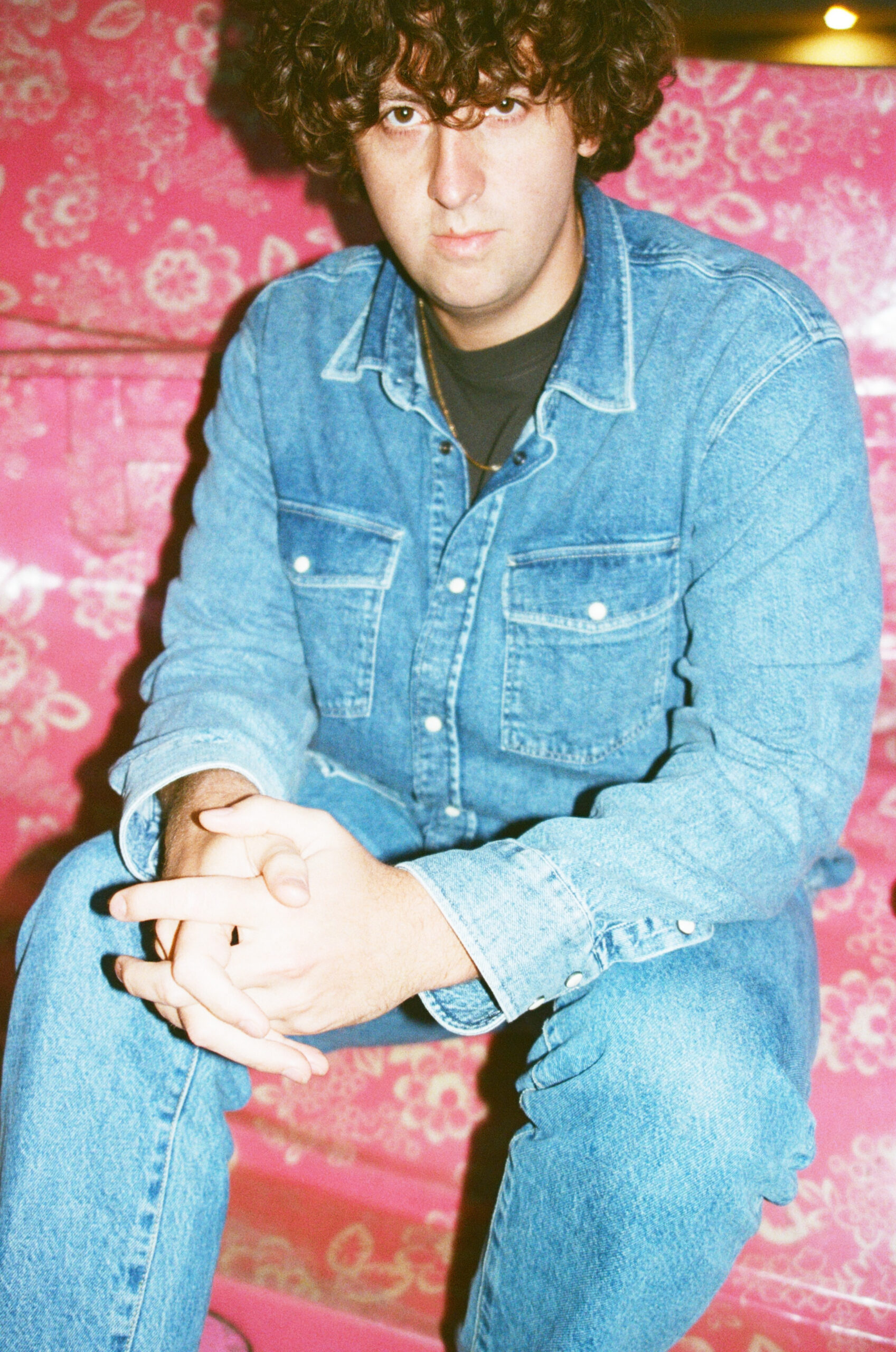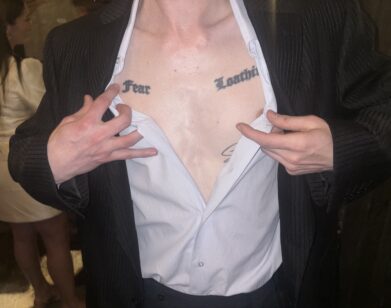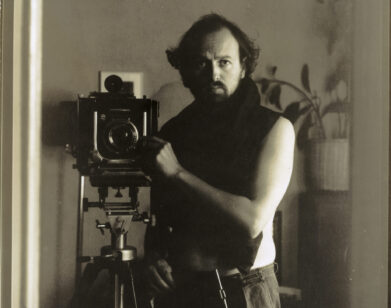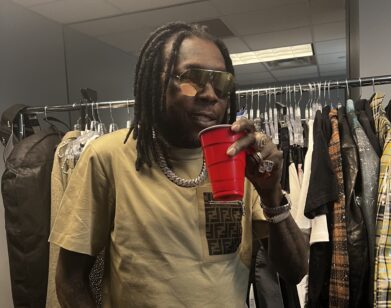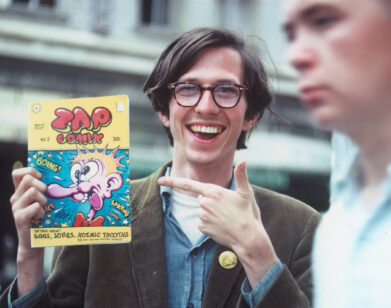IN CONVERSATION
Jamie xx Tells Olafur Eliasson How He Found His Way Back to Music
Jamie xx’s music is like free therapy, said the Danish artist Olafur Eliasson when the two found a moment to catch up between their respective shows. Growing up in London, the producer, born James Smith, found his love of music at a young age between the innately therapeutic rhythms of soul music and dance music, so the purpose of his work is never prescribed. As he puts it: “I think what people seem to connect with is the music that I’m just sort of lost in.” After a decade-long hiatus from solo projects, Smith dropped In Waves last year, a poetic electronic album that feels as naturally fresh as In Colour did ten years ago, featuring Honey Dijon, John Glacier, Robyn, and Nikki Giovanni (in keeping with his long-standing appetite for revolutionary lyricism). And now, he’s in the throes of a massive tour run, DJing arenas and raves around the world. But he wasn’t always one of the cool kids, he tells fellow self-described nerd Eliasson, whose latest trippy, site-specific installation is up at MOCA in Los Angeles. The two agreed on one thing: making art is what made them vulnerable enough to connect.
———
OLAFUR ELIASSON: Good to see you, Jamie.
JAMIE XX: You too. How are you?
ELIASSON: I’m good. I had a transition into the new year where I was in Denmark and Iceland with the family. I’m looking forward to relaxing a little bit at work.
JAMIE XX: Yes.
ELIASSON: And you? Have you come through into the next quarter of the first century?
JAMIE XX: I feel like today is the day that I have really started the year. I was in Bali playing a show, and I stayed there for a week surfing, which is great. But it wasn’t the real world, and now I’m in New York getting ready for some shows here.
ELIASSON: Bali? Not so bad. This transition only happened when you got back.
JAMIE XX: Well, I’ve kind of been not working for about a month now, not even opening my laptop, which is a nice feeling. But I also feel a bit untethered because of it.
ELIASSON: That sounds lovely. And your record came out last year, congrats on that.
JAMIE XX: Thank you.
ELIASSON: I listened to it and I like it a lot. I also got the towel. I actually used it yesterday to lay on.
JAMIE XX: Oh, good.
ELIASSON: Has it been a good experience coming out with a new record after all that time?
JAMIE XX: Definitely at the beginning when it came out, it was a big relief, but then going back into touring, all the crowds have been amazing, but it kind of feels like regressing personally a little bit because it’s just impossible to live well on tour. I used to be able to do that in my twenties, but it’s a bit more difficult to do it each day without the rest and the time for yourself. I’m trying to work it out. I’m on tour in the States now for a month.
ELIASSON: Oh my god. I was just on tour.
JAMIE XX: It’s a bit more fun on the bus, so it’s not flying every day.
ELIASSON: Does the bus say in big letters on the side, “Jamie on tour”?
JAMIE XX: I wish. That’s more of a ’70s vibe. It’d be cool if we could get the bus done with the waves.
ELIASSON: You’re in New York right now?
JAMIE XX: Yeah, I’m playing at the Armory for four days, which is fun, because we did the ballet there.
ELIASSON: Yeah, we did the ballet there. You’re back to ballet. So what do the Interview magazine readers need? It’s good to sell some tickets for your show, or for me to have more visitors. I have a show at L.A. MOCA. Are you going, by the way?
JAMIE XX: Oh yeah, in two weeks. Is it going to be on?
ELIASSON: Yeah, we can swap tickets. You’re playing in Berlin in March? I already checked.
JAMIE XX: Yeah. That’d be fun.
ELIASSON: Your tickets are much more expensive than mine, but that doesn’t matter. I’m trying to relax my attachment to outcome, but what people need is to feel acknowledged and heard, you know?
JAMIE XX: Yeah.
ELIASSON: When I make art, I actually work like that. I try to think, “What on earth is important enough to take people’s time with?”And when you make music, it’s clear, because the quality of the music is like a gift. It’s your own energy that you put out through the loudspeakers. When you had this long break, you had the chance to reconsider a lot of things in your life, and you came out of it with this record. And I think that’s the big version of what I’m doing now. Are you still feeling inspired?
JAMIE XX: There’s moments, like when I’m talking to somebody like you who’s inspiring, then everything’s firing. But I just spend so much time alone currently, on the road and in the dressing room. I need to find a way to balance a sense of community, and having people around that make me inspired. I’ve wanted to make music, but I’ve been holding back. That’s why I haven’t been working for the month. But in Bali, DJ Harvey was playing on New Year’s Eve, so I went to see him, and he’s built this amazing club, which is the best sounding room I’ve ever heard. He played from midnight till 6 a.m., and I just stood there and listened all night and got to chat to him. That was super inspiring because he’s been doing what I do for so long. He was giving me some insight into how you can keep that up and how he does it now. He seems like a very happy dude, and he only does exactly what he wants to do. It’s a good place to be. It’s inspired me to think about how to do this long term. I haven’t got any answers, really, but I’ve been thinking about it.
ELIASSON: To have inspiration is pretty difficult. I completely understand what you’re saying, I think. It’s like I said before, I’m relaxing my attachment to outcome. I’ll try to get inspired by forcing myself, and then I keep looking at the outcome and it is not really interesting. So I lower my attachment to outcome by working with what I have here, and with the people who are around, and something will come out of it. And inspiration is something everybody wants, I guess.
JAMIE XX: You’re totally right. For me, it’s the energy to get back into it that I find difficult. But as soon as I start, I get the ball rolling. You are in your studio in Berlin and you have so many people around. It’s buzzing the whole time. Do you find that helps?
ELIASSON: Yeah. Like you, sometimes when I’m alone for longer, I sometimes start to wonder whether I really exist, or whether I’m just the idea of somebody else. That’s why sometimes I get obsessed with checking whether I have a shadow. This is not a joke. So then I started working a lot with shadows. If there’s a long shadow, the light of the sun is low in the sky. So you can even tell from the shadow not just that you’re there, but also what time it is or where you are. The shadow is like your own free of charge GPS. It’s a nice place to begin when I’m afraid of getting lost, and when I feel alone. And you can be with people and still feel alone, but the team I have around me, they hold me accountable to myself and my inspiration. There’s a lot of friction as well, which is great.
JAMIE XX: Yeah, that’s good.
ELIASSON: Everyone wants to feel inspired, and the inspiration has a little sister called purpose. And I think one can hear it in your music. Depending on where you play it, that shines through, and it really hits you. It feels important and relevant, what you’re doing. It has a purpose somehow.
JAMIE XX: I find it very difficult to make music whenever I think of the purpose of it, really. I do make loads of it thinking about the purpose and how people are going to react to it, but usually that stuff kind of falls flat. I think what people seem to connect with is the music that I’m just sort of lost in. I wish I knew how to do it with intent more. It’d be a lot easier, and it could be a bit of a formula.
ELIASSON: Maybe the intent is a little out of sync with your creativity. Sometimes we are so obsessed with the idea of making a bridge crossing the river. And once on the other side, you turn around and you look back, and then realize you got it all wrong in the first place. But had you not gone across… I just like the sort of more hospitable idea of allowing for a degree of messiness.
JAMIE XX: Yeah, definitely. It makes a lot of sense.
ELIASSON: Yeah, and now we have known each other for a long time. In a certain way you come across as being more vulnerable and less defensive. It’s much easier to be inspired when you’re less defensive. Being vulnerable can allow people to extract from you more, but there’s a courage in that. It’s cool.
JAMIE XX: That’s very right. I was very closed off until I turned about thirty. And then I sort of had a freakout, as we talked about, and for a long time I was not able to make music. All of that made me able to be more vulnerable. It was a lot easier in my twenties, because I was just going for it the whole time. And now I overthink everything and it’s more difficult, but I am also happier than I was. It’s a weird contradiction.
ELIASSON: That’s good. I’m also happier than I used to be. I was never happy. I thought I was not good enough. Even when I did something that was successful, I was still like, “Well, it’s not really about success, is it?” Do you recognize that?
JAMIE XX: Totally. I still feel like that. I find it quite excruciating to listen to anything I’ve ever done in the past, even though I have to play it all the time. It’s nice to see people enjoy it. But I just look forward to playing other people’s music, and making new stuff, even though I know that I’ll end up feeling like that about the new stuff eventually as well. Do you feel like that about stuff you’ve made more recently, or has there been a switch?
ELIASSON: I mean, it used to be more like that. But I started caring less. I became kind of indifferent. I tried to have a conversation with that part of me that was not feeling good enough, and it turns out that I had in my childhood a need to be seen and acknowledged. My parents were only 22 when they got married, so there was a situation there. My father wanted to be an artist, so I said I would be an artist just so he would love me, and maybe he would marry my mother again. It is not really good for a child to carry that burden. It’s interesting that the lack of self appreciation later in life can be traced back to such things as situations like this. And then, just before I did my exhibition at the Tate, my father died rather suddenly. Still today sometimes, I think, “I wish my father was alive to see this and be happy.” Of course, it was not the bloody exhibitions that would’ve made—
JAMIE XX: Yeah.
ELIASSON: But the love was not in good flow. There was not a good flow of energy. So it’s only recently that I talked to that little guy who was an artist just to make his father happy, and I said to him, “You are good enough.” I’m 57, and it’s taken me half a century to arrive at the conclusion that I’m okay, and that’s why I’m happy.
JAMIE XX: Sounds like a good place to be. I definitely relate to that same feeling, with different starting points. The reason that I got into this was basically because I was unable to connect with anyone when I was a kid. The only way to feel like I could connect, but still not have to actually engage with people, was to be making something from afar, or performing from afar for a bunch of people having a good time. And since then, I’ve gotten a lot better at interacting with people, and I actually quite like being in social situations sometimes. So it’s all changed, and the reasons why I do this have all changed too, which makes me rethink it a lot.
ELIASSON: That’s why you appear more unafraid of being present in your vulnerable state. Not vulnerable in the sense you’re falling apart, just honest. And this is a great place from where one can be creative and shape things. That’s a good takeaway. That connection with people can be your dialogue, or your purpose.
JAMIE XX: Exactly. Or to feel more important than I felt. Everybody struggles being a teenager, in one way or another. I was one of the weird kids at school, and that was my way out. I was bad at everything at school. So I had this one thing that I discovered I could kind of do, and it was outside of school.
ELIASSON: Yeah, I’m sure a lot of people identify with that. I was a nerd. We have that in common.
JAMIE XX: But weren’t you also a break dancer? That doesn’t seem very nerdy.
ELIASSON: Oh, yeah. I was 14, so it’s like ’81, and I saw some American exchange students performing in a shopping window in Denmark, moving like robots. And I had just bought my first fluorescent sweater. I lived in the countryside, where there were cows and people. We were dropped off to school with a tractor. So I was looking at this window, and I had never in my life had an epiphany until then. I didn’t just see the dancer. I saw other people looking at the dancer. I was like, “Oh my god, this cannot be real.” The country kids back home, they are not here. So I went back, and my mother was going crazy, because I got out of bed moving like a robot and I moonwalked into the bathroom, did my electric boogie toothbrushing. I was not good at it. But if you do it like that, you kind of get good at it. Six months later, there’s a small club. I’m 15, but you have to be 18 to get in. And to keep my nerd account alive, I had blonde in my hair on the front only, like Limahl from Kajagoogoo, and I had red riding pants on. I knew I couldn’t get into the club, but I stood there and did my electric boogie. And what was very nice, of course, was that everybody looked at me. Being this kid who had an issue with overly needing affirmation, I was like, “My god, this is great.” I felt I was in dialogue. And then the doorman at this club said, “We need to get the customers in.” So then I got into the club. That was an important lesson in my life. You need to make them need you more than you need them. Eventually, I found that the street is a beautiful space to work. That is also why I got into music. My taste in music was really influenced by this. That’s why I like your music so much, too.
JAMIE XX: Well, I love the breaking music from that era. And it’s always inspiring to talk to you, because I just want to listen. That’s my position in life most of the time. And you’re one of the best people to listen to. I always come away with something.
ELIASSON: Well, we spoke before and I was inspired by that. Sometimes, you hear a song and you just have a feeling you can’t really figure out. But this song gives that feeling a scaffold or a structure. Great music and culture, a great book, a painting, a ballet, is doing that in the world. And the idea that there is stuff in the world that allows you to be yourself in a version that you have not yet met is so liberating. You said that sometimes, a great song is as if it has been sent from the future. Isn’t that just fascinating? That suddenly you can feel home in something new that you have never heard before? I’m very grateful to you because home is not necessarily a place. To the reader, we are very grateful for you reading this much, and if anything of what we said was resonating with you, that’s what it’s about. With regards to feeling seen, I hear your music, and I go, “Had I been music, I would sound like that.” It’s like free therapy. So go to the L.A. MOCA, with Jamie’s record on your headset. Then you can save money on therapy.
JAMIE XX: That’s some good advice.
ELIASSON: Have a good show tonight.

